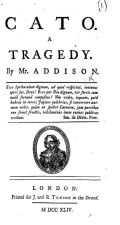While looking for something else in the Cathedral Treasurer’s Book for 1743/44 (CCA-DCc-TB/79), I came across the following entry on page 68:
Expensa incerta
Nov 9 Given to the Soldiers who guarded the Play-house Nov: 5. to keep off the Mob from rushing on the Dean & Prebs whilst the Kings Scholars were acting before them the Tragedy of Cato. [£] – 10-6
 This expenditure is listed by the Canon Treasurer as an expensa incerta, i.e. an unexpected expenditure which was not budgeted for. Some elements of the entry are easy to explain. The play in question is Joseph Addison’s Cato, a Tragedy, written in 1712, first performed on 14 April 1713, and immensely popular in the eighteenth century. An annual performance of a play by the boys of the King’s School was a long-standing tradition, regularly rewarded by the Dean and Chapter with a gift or the payment of expenses. On this occasion it was performed in the city’s Playhouse instead of within the Precincts.
This expenditure is listed by the Canon Treasurer as an expensa incerta, i.e. an unexpected expenditure which was not budgeted for. Some elements of the entry are easy to explain. The play in question is Joseph Addison’s Cato, a Tragedy, written in 1712, first performed on 14 April 1713, and immensely popular in the eighteenth century. An annual performance of a play by the boys of the King’s School was a long-standing tradition, regularly rewarded by the Dean and Chapter with a gift or the payment of expenses. On this occasion it was performed in the city’s Playhouse instead of within the Precincts.

The Playhouse is also well documented. It was the upper storey of the market building constructed in the Buttermarket (at that time called the Bullstake) at the expense of John Somner in 1664 at a cost of over £400. It had an open ground floor where the market was held, similar to the ones in Faversham or Tetbury. The upper floor had two rooms where the town’s guilds were to meet; above that were garrets where Somner proposed the storage of corn for distribution to the poor in times of shortage. One or both of the upper rooms were used as the town’s Playhouse until its demolition in 1789. This building is discussed by David Lewis on the Canterbury Historical and Archaeological Society’s web site.  Somner and the City Burgmote fell out about the terms of his bequest to the city; this is documented in a pamphlet published by Somner in 1666.
Somner and the City Burgmote fell out about the terms of his bequest to the city; this is documented in a pamphlet published by Somner in 1666.
Why did the Dean and Prebends need a military guard to go the few yards from the main gate of the Precincts to the Playhouse in the Buttermarket? Were they particularly unpopular with ‘the Mob’ at this date? Was the date of 5 November significant, perhaps with crowds gathered for a Guy Fawkes night? My guess is that the performance was a private one just for the Dean and his colleagues and that the guard was to keep out townsfolk who might also want to see the play. Yet it seems odd to require a military presence for that purpose. How many soldiers did you hire for ten shillings and sixpence in 1744?
The local newspaper, the Kentish Post gives no clue about this event. There is no advertisement for the play nor a report about an incident taking place.
